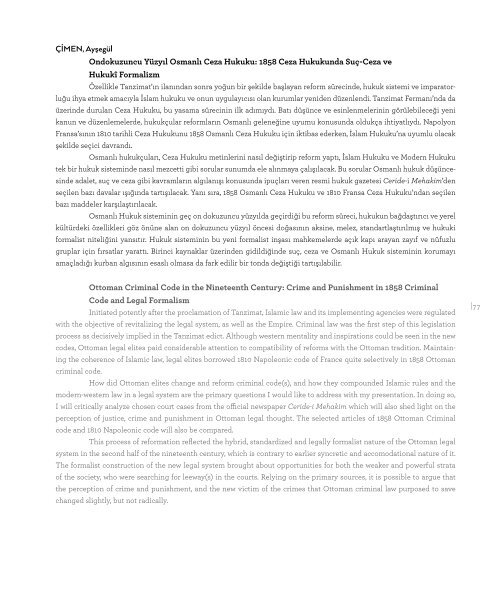14 - 17
MdZ0re
MdZ0re
You also want an ePaper? Increase the reach of your titles
YUMPU automatically turns print PDFs into web optimized ePapers that Google loves.
ÇİMEN, Ayşegül<br />
Ondokuzuncu Yüzyıl Osmanlı Ceza Hukuku: 1858 Ceza Hukukunda Suç-Ceza ve<br />
Hukukî Formalizm<br />
Özellikle Tanzimat’ın ilanından sonra yoğun bir şekilde başlayan reform sürecinde, hukuk sistemi ve imparatorluğu<br />
ihya etmek amacıyla İslam hukuku ve onun uygulayıcısı olan kurumlar yeniden düzenlendi. Tanzimat Fermanı’nda da<br />
üzerinde durulan Ceza Hukuku, bu yasama sürecinin ilk adımıydı. Batı düşünce ve esinlenmelerinin görülebileceği yeni<br />
kanun ve düzenlemelerde, hukukçular reformların Osmanlı geleneğine uyumu konusunda oldukça ihtiyatlıydı. Napolyon<br />
Fransa’sının 1810 tarihli Ceza Hukukunu 1858 Osmanlı Ceza Hukuku için iktibas ederken, İslam Hukuku’na uyumlu olacak<br />
şekilde seçici davrandı.<br />
Osmanlı hukukçuları, Ceza Hukuku metinlerini nasıl değiştirip reform yaptı, İslam Hukuku ve Modern Hukuku<br />
tek bir hukuk sisteminde nasıl mezcetti gibi sorular sunumda ele alınmaya çalışılacak. Bu sorular Osmanlı hukuk düşüncesinde<br />
adalet, suç ve ceza gibi kavramların algılanışı konusunda ipuçları veren resmi hukuk gazetesi Ceride-i Mehakim’den<br />
seçilen bazı davalar ışığında tartışılacak. Yanı sıra, 1858 Osmanlı Ceza Hukuku ve 1810 Fransa Ceza Hukuku’ndan seçilen<br />
bazı maddeler karşılaştırılacak.<br />
Osmanlı Hukuk sisteminin geç on dokuzuncu yüzyılda geçirdiği bu reform süreci, hukukun bağdaştırıcı ve yerel<br />
kültürdeki özellikleri göz önüne alan on dokuzuncu yüzyıl öncesi doğasının aksine, melez, standartlaştırılmış ve hukuki<br />
formalist niteliğini yansıtır. Hukuk sisteminin bu yeni formalist inşası mahkemelerde açık kapı arayan zayıf ve nüfuzlu<br />
gruplar için fırsatlar yarattı. Birinci kaynaklar üzerinden gidildiğinde suç, ceza ve Osmanlı Hukuk sisteminin korumayı<br />
amaçladığı kurban algısının esaslı olmasa da fark edilir bir tonda değiştiği tartışılabilir.<br />
Ottoman Criminal Code in the Nineteenth Century: Crime and Punishment in 1858 Criminal<br />
Code and Legal Formalism<br />
Initiated potently after the proclamation of Tanzimat, Islamic law and its implementing agencies were regulated<br />
with the objective of revitalizing the legal system, as well as the Empire. Criminal law was the first step of this legislation<br />
process as decisively implied in the Tanzimat edict. Although western mentality and inspirations could be seen in the new<br />
codes, Ottoman legal elites paid considerable attention to compatibility of reforms with the Ottoman tradition. Maintaining<br />
the coherence of Islamic law, legal elites borrowed 1810 Napoleonic code of France quite selectively in 1858 Ottoman<br />
criminal code.<br />
How did Ottoman elites change and reform criminal code(s), and how they compounded Islamic rules and the<br />
modern-western law in a legal system are the primary questions I would like to address with my presentation. In doing so,<br />
I will critically analyze chosen court cases from the official newspaper Ceride-i Mehakim which will also shed light on the<br />
perception of justice, crime and punishment in Ottoman legal thought. The selected articles of 1858 Ottoman Criminal<br />
code and 1810 Napoleonic code will also be compared.<br />
This process of reformation reflected the hybrid, standardized and legally formalist nature of the Ottoman legal<br />
system in the second half of the nineteenth century, which is contrary to earlier syncretic and accomodational nature of it.<br />
The formalist construction of the new legal system brought about opportunities for both the weaker and powerful strata<br />
of the society, who were searching for leeway(s) in the courts. Relying on the primary sources, it is possible to argue that<br />
the perception of crime and punishment, and the new victim of the crimes that Ottoman criminal law purposed to save<br />
changed slightly, but not radically.<br />
|77


